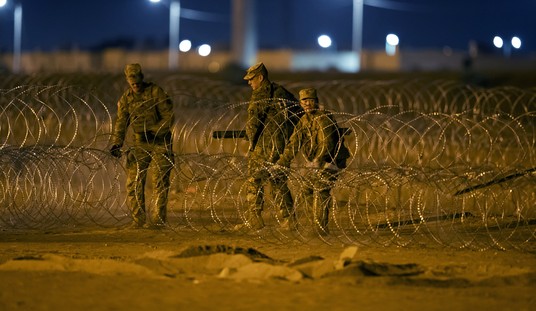On one hand, it’s difficult not to empathize with University of Texas System Director of Police Michael Heidingsfield when he tells CBS’ Manuel Bojorquez that he’d rather have a mine-resistant military vehicle and not need it than the other way around. On the other hand, what possible reason could a university need a mine-resistant vehicle designed for use in Iraq and Afghanistan, anyway? The debate over the militarization of police forces in the US now extends to college campuses, which have acquired $13 million in Pentagon gear over the last few years, including nine of the IED-resistant armored behemoths:
The university’s police department is one of at least 125 school law enforcement agencies in 25 states that have received military gear free of charge from the Department of Defense. That includes police departments for 23 kindergarten-through-12 school districts and 102 colleges and universities.
The DOD program came under scrutiny in August when police responded to protests in Ferguson, Missouri, with tanks, combat gear and assault rifles – some of which had come from the Pentagon.
A CBS News review of available public data from more than 30 states found that law enforcement agencies affiliated with educational institutions have obtained more than $13 million worth of military gear from the program. Among the items received: 145 pistols, 780 rifles and nine of the mine resistant vehicles.
One police force in San Diego has decided to give up their armored vehicle, but the University of Texas and other systems aren’t as quick to part with the materiel. They point to heightened concerns over mass shootings as one reason to acquire weapons and armor:
But many agencies say the threat to their institutions is evolving and point to mass shootings – like Columbine, Virginia Tech and Sandy Hook – as reasons their response must evolve too.
“I’m required to protect and serve the University of Texas System,” Heidingsfield said. “I ought to employ or have in my repertoire every possible tool. I hope that vehicle never has to leave the warehouse it sits in. But if I don’t have it, and then we need it, I’ve not made the right decision.”
In the aftermath of the Ferguson riots, one criticism of the Pentagon program was that it eroded the impact of the Posse Comitatus Act. The PCA prohibits the US military from acting as a law-enforcement agency, but these sales make local police departments into paramilitary forces, critics argued. That misses the point of the PCA, which intended to protect local communities and states from federal authority, not so much from advanced weaponry. (Besides, the PCA may have other challenges at the moment.) SWAT units use paramilitary tactics and weaponry, although not usually heavy armor. When Los Angeles added an armored vehicle to use as a battering ram in the 1980s under Chief Daryl Gates, it created a short-lived storm of controversy in the local area, and inspired a hilarious send-up in Die Hard. Now that battering-ram scene seems rather quaint, no?
The real concern is that these systems create a gulf between the police and the communities they serve by making them appear like an occupying force — and perhaps at times act like one, too. The riots in Ferguson continued with and without that kind of presence on the streets, and it’s arguable in the chicken-egg sense whether the response triggered the riot or the riot triggered the response. Having armored vehicles roll into one’s town, along with snipers with scopes, certainly seems provocative, to say the least.
Still, one might be able to make an argument for a major city to have one of these vehicles, especially in an era of international Islamist terrorism, but a university police force? If the necessity arose to use an armored vehicle, a state’s National Guard could be called to provide it under local authority by the governor, although it might not be as convenient as having one parked in the lot. At a time when we need to de-escalate the tensions between law enforcement and the communities they serve, selling off surplus armored vehicles to university police just seems like a bad idea.








Join the conversation as a VIP Member